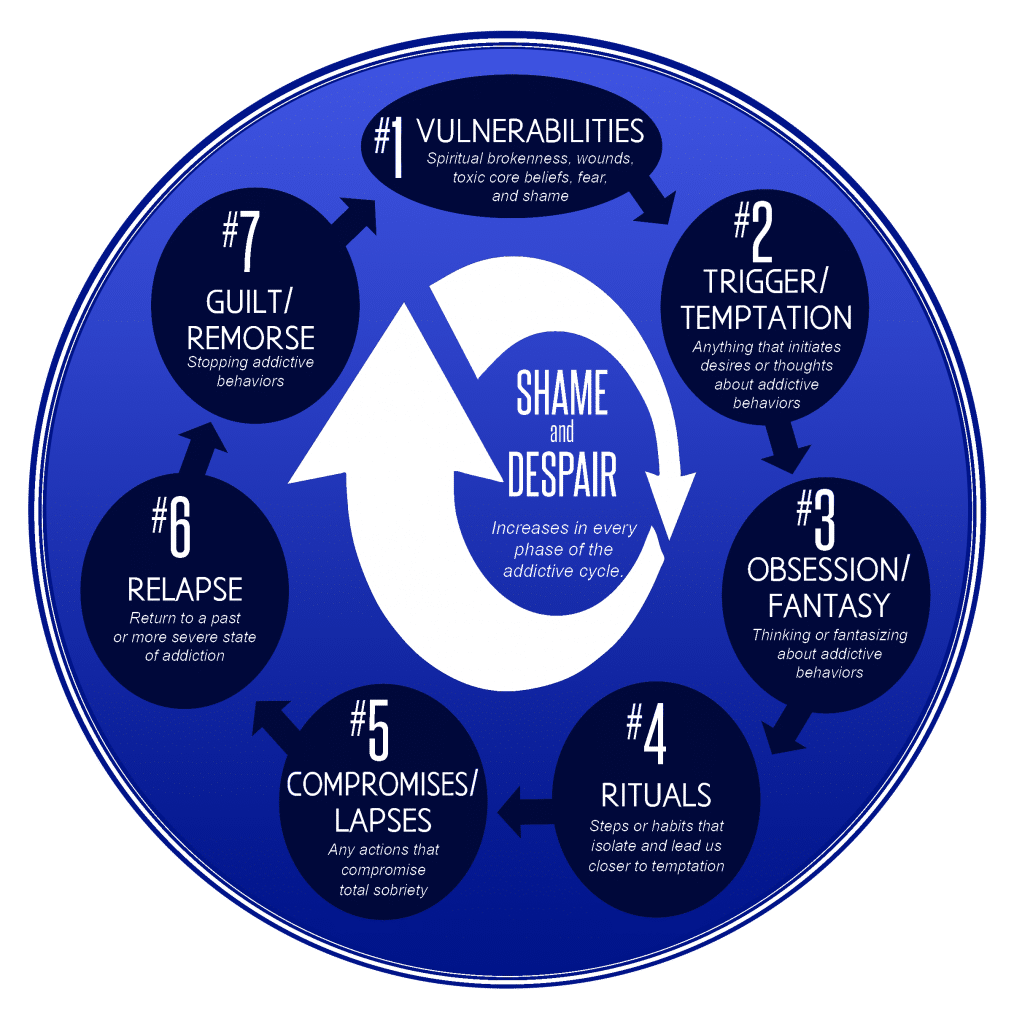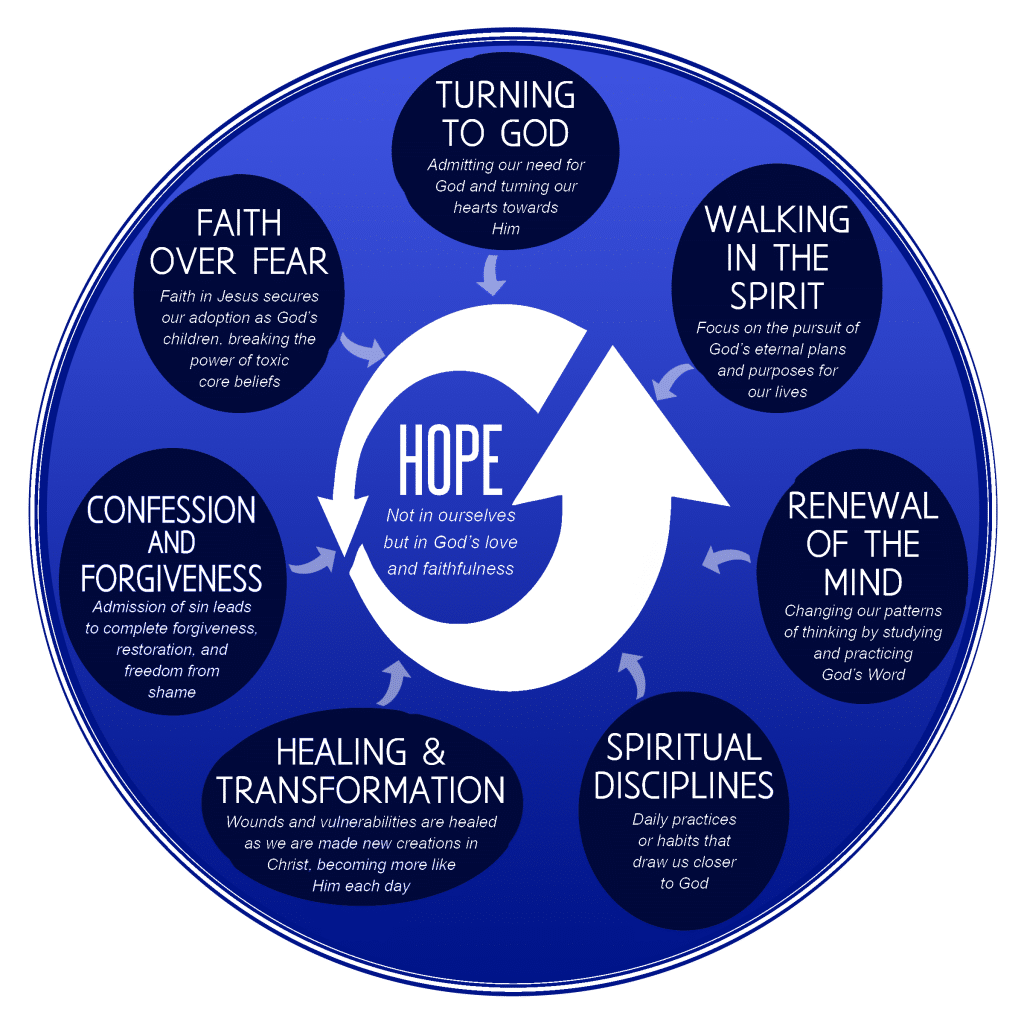Common Motivations/Vulnerabilities
ADRENALINE: “It seemed fun.” “It was just there, so why not?”
SOCIAL: “So I could fit in or connect with him/her.” “My family/caregiver did it/gave it to me
EMOTIONAL: “So I could relax.” “To escape pain.” “To escape rejection.”
MENTAL: “I was curious.” “I was bored.”
REBELLION: “To teach them a lesson.” “To take control.”
ENVIRONMENTAL: “It was forced upon me.” “Because my doctor prescribed too much.”
__________________________: “_______________________________________________”
__________________________: “_______________________________________________”
__________________________: “_______________________________________________”
Which of these do you most relate to? Circle any that apply to you (more than one is common).
If your past motivations or vulnerabilities aren’t listed, write those in the spaces provided.
What original motivation(s) or vulnerability are still areas of concern? Please explain.
• Let’s Read: 1 Peter 5:8-9
• Let’s Read: Romans 1:21-23 & James 1:13-15
• Let’s Read: John 8:36 & Romans 6:5-11
In your opinion or experience, how does turning to God affect the addictive cycle?
• Let’s Read: Romans 6:20-23
• Let’s Read: 1 Corinthians 10:13
In your opinion, how does God provide us “a way” when we experience temptation?
Whenever you feel fear, doubt, or shame slipping in, remember that Jesus has already secured
your victory (1 Cor 15:57)! And for every tactic the enemy has, God provides a way out
(1 Cor 10:13)
Key Takeaway: “When you focus on managing the addictive cycle, it creates a fear-based
mindset. When you focus on the hope God provides for an abundant life (filled with purpose), you
can leave the addictive behind and step forward in faith.”
Now think about the higher purpose or goals God is calling you to fulfill today.
What do you need to focus on for the next few weeks or months?
What spiritual habits can you develop?
How could you help others this week?
How could you honor or serve God today?
Resources
Counseling
Support Groups
Residential treatment
Devotional Apps
Hotlines


How can you know if you or somebody you know is addicted?
If someone answers “Yes” to at least five of the questions below, that person is more than likely an addict.
- Do you spend a great deal of time talking or thinking about getting high?
- Do you use alone or when no one else is using?
- Have you ever had a blackout or memory loss during or after use?
- Do you hoard or protect an extra supply to keep from running out?
- Do you need more and more of a substance to get high?
- Do you use more than originally planned?
- Do you use to escape from your problems?
- Do you do anything to get a large amount of substance into your body quickly?
- Is your use worrying or upsetting your family?
- Do you lose time at school or work due to use?
- Do you use first thing in the morning?
- Do you avoid people/places that do not condone your usage?
- Do you spend more money on substances than you can afford?
- Do you use one substance to offset the effects of another?
- Do you lie about how much you’re using?
- Do you do things under the influence that you wouldn’t do while sober?
- Do you think you need to be high to have a good time?
- Have you tried to control your use, but failed?
- Are you ashamed of your use?
- Have you watched your spiritual life decline or disintegrate because of use?
Call Out: Don’t hide your decision to be clean. Tell others about your stand, and confront your using friends about their problem.
Live Loud: A life well-lived is a stronger argument for the truth than the loudest shouting match could ever be. Plan drug-free activities. Put your God-given talents to use and have fun with them. Most of all, through your attitude, actions and words, let others know that a drug-free life is more delightful than the greatest induced high.
Educate Yourself Enough: No matter how well you live, times will come when you’ll need to give some answers for your actions. Know why you’ve chosen to live the way you do and why others should, too. Learn truth about substances, then learn how to refute the misleading statistics and false facts users will throw at you. Take time to teach others what you’ve learned about substances as well.
Anticipate Adversity: Those who take a stand to stay clean will face adversity at some time. Peers may mock you. Friends may ignore your counsel and use anyway. You might even find yourself tempted to give in and start using. These things should be expected. Plan how you’ll react to them.
Never Give Up: Perseverance is the final and most important part of staying clean. What if friends keep using? What if others don’t listen? And let’s be honest: What if you’re one of those who — even with the best intentions — ends up using? No matter how bad your situation might get, you can always turn things around with enough effort and divine aid. So get on your knees and don’t give up.






